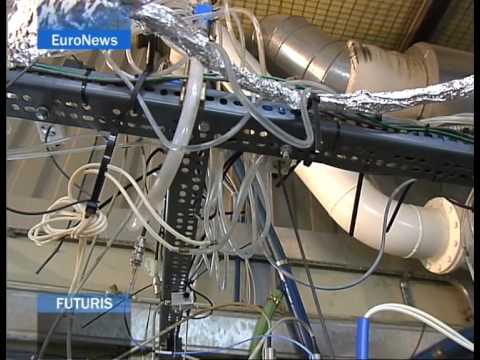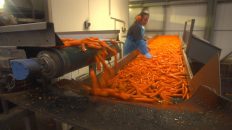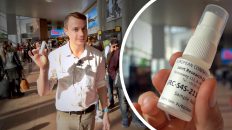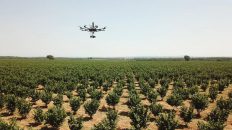It’s already the cheapest and greenest form of global tranportation, but the shipping industry is still looking to improve. Two huge research projects are preparing new ways of coping with an expected increase in maritime traffic. Shaping the future of shipping- in this weeks Futuris.
The Elefsis shipyard in Greece has been producing ships for around two and a half thousand years. Workers here have used their predecessors know-how to develop vessels that are today one of the most reliable and efficient means of transport.
Design challenges have been met and engineering obstacles overcome.
One of todays biggest hurdles is pollution. The coordinator of the HERCULES project explains how that concern is being tackled.
Nikolaos P. Kyrtatos, HERCULES Project coordinator: “This is a new-built ship, so obviously it has a state-of-art engines built today. The objective is – since there’s room for improvement, both in efficiency and in emissions, we try to improve this engine so that we could get the same power, or more power out of them, using the same fuel but with less emissions. So this is the objective of the project HERCULES.”
Shipping is one of the greener methods of transport, but there is always room for improvement.
Virtually all ships use diesel engines that run on cheap fuel thats emits Carbon Dioxide, Nitrogen Oxides and Sulphur. A cleaner fuel would require refining facilities that simply do not exist, so the most realistic way of cutting emissions is to burn less fuel. Hence the quest for a more efficient engine.
Thats what the many different partners that make up the HERCULES project are aiming for.
Armed with a 33 million euro budget, half of which comes from a European Commission subsidy, HERCULES has been on the case for three years. Its even brought together fierce competitors in the maritime market.
Environmental concerns are obviously pressing, but the fact it will save shipping companies money makes it all the more enticing.
With the rising price of oil, an engine that makes fuel go that little bit further is a welcome advantage of going green.
Nikolaos P. Kyrtatos, HERCULES Project coordinator: ”The higher the oil prices go, the more interesting would be to have technologies which improve the efficiency. This is a general rule: if the oil prices are down – nobody cares about efficency improvement. But it’s not only the price of what you’re burning – it’s what comes out of the burning of fuel.”
To make engines more efficient, all the components need to be changed. Its a complicated task, and one that needs the expertise of many contributors.
Nikolaos P. Kyrtatos, HERCULES Project coordinator: “The project encompasses most of the countries in Europe – we have about 10 countries participating, and more that 40 organisations – that is including industry research organisations, universities, subsuppliers of engine makers… The core of the project are the two major engine maker groups, and I would say this is important, because those two groups are in fact competitors in the world market; together they hold more that 85-90% of the world’s market, in fact they’re the world leaders. And they have decided to collaborate.”
The project is spearheaded by the two market leaders, MAN Diesel and Wartsila. Before HERCULES any cooperation between the two was unthinkable, according to bosses at Wartsila’s factory in Vaasa, Finland.
Now though their research and development departments have put their heads together to fight a common foe- the growing Asian shipping market.
Juha Kytölä, the President of Wärtsilä Finland Oy: “It was a downturn in the industry few years ago, and we both were very concerned together with MAN and us, that the industry might turn from Europe to Asia. At the same time we noticed that by teaming up we also can get contribution from EU, and we started a very well focused cooperation.”
The next phase of the HERCULES project hopes to reduce fuel consumption by 3 percent, and nitrogen oxide by 30 percent by 2011.
Another EU-backed initiative is the improvement of safety in ice-covered Arctic waters.
The SAFEICE project comes at a time when Arctic traffic is on the rise.
Scientists at Helsinki’s Technological University are using miniature scale models to see how successful a ship’s hull is in breaking the ice.
Pentti Kujala, SAFEICE Project coordinator: “We’ll have more reliable design methods how to design the ship hull to take account of the ice conditions, to take account of statistics of ice loading. And to analise the damages so that we know what kind of loading will happen in the ice.”
Global warming means that new Arctic paths are expected to open up as the ice retreats. Traffic is also set to increase as more oil and gas is shipped from newly-found sources in northern Russia.
Pentti Kujala, SAFEICE Project coordinator: “We’re quite sure that in the near future the activities in the Russian Arctic will increase, and this kind of expertise is needed to design ships to find and transport oil and gaz from Arctic to, for example, to Europe.”
At the moment all ships entering Finnish and Swedish ports are helped out by ‘ice-breakers’- special ships that forge a path through the ice for tankers to follow. But a lack of these trail blazing ships, and increasing demand, means this cannot happen and many ships are running the risk of accidents. Other frequent users of the Arctic, such as Russia and Canada have no universal regulations.
SAFEICE aims to create a common approach to ensure ships are specially designed to meet the challenge put to them by icy conditions. It will also improve the charting and forecasting of the waters, as well as traffic control.
Shipping is already less expensive and more environmentally friendly than land or air transport. But that does not mean its all plain sailing- there is no room for complacency.
Advanced research projects such as HERCULES and SAFEICE are helping to raise the bar in the industry, in anticipation of the difficulties that lie on the horizon.





